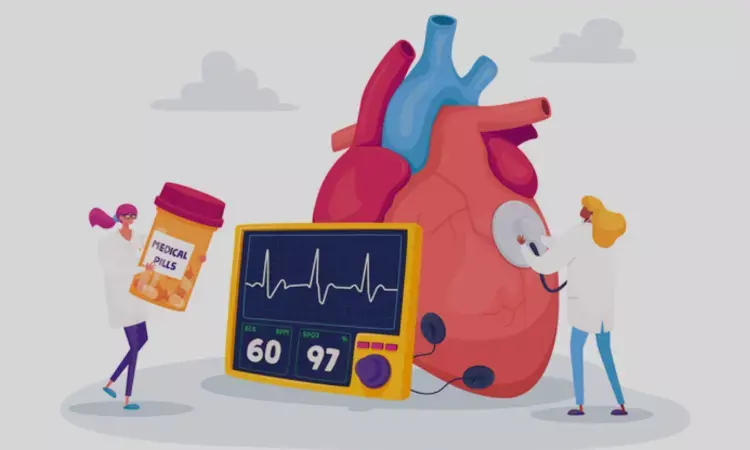- Home
- Medical news & Guidelines
- Anesthesiology
- Cardiology and CTVS
- Critical Care
- Dentistry
- Dermatology
- Diabetes and Endocrinology
- ENT
- Gastroenterology
- Medicine
- Nephrology
- Neurology
- Obstretics-Gynaecology
- Oncology
- Ophthalmology
- Orthopaedics
- Pediatrics-Neonatology
- Psychiatry
- Pulmonology
- Radiology
- Surgery
- Urology
- Laboratory Medicine
- Diet
- Nursing
- Paramedical
- Physiotherapy
- Health news
- Fact Check
- Bone Health Fact Check
- Brain Health Fact Check
- Cancer Related Fact Check
- Child Care Fact Check
- Dental and oral health fact check
- Diabetes and metabolic health fact check
- Diet and Nutrition Fact Check
- Eye and ENT Care Fact Check
- Fitness fact check
- Gut health fact check
- Heart health fact check
- Kidney health fact check
- Medical education fact check
- Men's health fact check
- Respiratory fact check
- Skin and hair care fact check
- Vaccine and Immunization fact check
- Women's health fact check
- AYUSH
- State News
- Andaman and Nicobar Islands
- Andhra Pradesh
- Arunachal Pradesh
- Assam
- Bihar
- Chandigarh
- Chattisgarh
- Dadra and Nagar Haveli
- Daman and Diu
- Delhi
- Goa
- Gujarat
- Haryana
- Himachal Pradesh
- Jammu & Kashmir
- Jharkhand
- Karnataka
- Kerala
- Ladakh
- Lakshadweep
- Madhya Pradesh
- Maharashtra
- Manipur
- Meghalaya
- Mizoram
- Nagaland
- Odisha
- Puducherry
- Punjab
- Rajasthan
- Sikkim
- Tamil Nadu
- Telangana
- Tripura
- Uttar Pradesh
- Uttrakhand
- West Bengal
- Medical Education
- Industry
Treatment with selective aldose reductase inhibitor effective against diabetic cardiomyopathy? Study provides insights

USA: In a significant stride towards combating the complications of diabetes, a recent randomized trial has unveiled promising results regarding the efficacy of a selective aldose reductase inhibitor in managing diabetic cardiomyopathy. The trial, conducted by a team of researchers from renowned medical institutions, sheds light on a potential breakthrough in treating a severe complication associated with diabetes.
The researchers found that among individuals with diabetic cardiomyopathy (DbCM) and impaired exercise capacity, treatment with AT-001, a highly selective aldose reductase inhibitor, for 15 months did not significantly better exercise capacity compared with a placebo. However, several signals of benefit support a hypothesis that heart failure might be preventable if the polyol pathway, which features aldose reductase upregulation, is inhibited early.
The findings were published online in the Journal of the American College of Cardiology on April 8, 2024.
Progression to symptomatic heart failure is a complication of type 2 diabetes (T2D); heart failure onset in this setting is commonly preceded by deterioration in exercise capacity.
Diabetic cardiomyopathy, a condition characterized by structural and functional changes in the heart muscle, is a leading cause of morbidity and mortality among diabetic patients. Despite advancements in diabetes management, therapeutic options for diabetic cardiomyopathy remain limited, highlighting the urgent need for innovative treatments.
Against the above background, James L. Januzzi, Cardiology Division, Massachusetts General Hospital and Harvard Medical School, Boston, Massachusetts, USA, and colleagues sought to determine whether AT-001 can stabilize exercise capacity among individuals with diabetic cardiomyopathy and reduced peak oxygen uptake (Vo2).
Six hundred and ninety-one individuals with DbCM meeting inclusion and exclusion criteria were randomized to twice daily placebo or ascending doses of AT-001. The mean age was 67.5 ± 7.2 years, and 50.4% of participants were women. Stratification at inclusion included region of enrollment, use of glucagon-like peptide-1 receptor agonists or sodium-glucose cotransporter 2 inhibitors, and cardiopulmonary exercise test results.
The primary endpoint was a proportional change from baseline to 15 months in peak Vo2. Subgroup analyses included measures of disease severity and stratification variables.
The study led to the following findings:
- By 15 months, peak Vo2 fell in the placebo-treated patients by –0.31 mL/kg/min, whereas in those receiving high-dose AT-001, peak Vo2 fell by –0.01 mL/kg/min; the difference in peak Vo2 between placebo and high-dose AT-001 was 0.30.
- In prespecified subgroup analyses among those not receiving glucagon-like peptide-1 receptor agonists or sodium-glucose cotransporter 2 inhibitors at baseline, the difference between peak Vo2 in placebo vs high-dose AT-001 at 15 months was 0.62 mL/kg/min.
While further research is warranted to validate these findings and explore long-term outcomes, the results of this randomized trial offer a beacon of hope for individuals living with diabetic cardiomyopathy. As researchers continue to unravel the complexities of this condition, the pursuit of innovative treatments remains paramount in improving the quality of life and prognosis for diabetic patients worldwide.
Reference:
Januzzi JL Jr, Butler J, Del Prato S, Ezekowitz JA, Ibrahim NE, Lam CSP, Lewis GD, Marwick TH, Perfetti R, Rosenstock J, Solomon SD, Tang WHW, Zannad F. Randomized Trial of a Selective Aldose Reductase Inhibitor in Patients With Diabetic Cardiomyopathy. J Am Coll Cardiol. 2024 Apr 3:S0735-1097(24)06613-0. doi: 10.1016/j.jacc.2024.03.380. Epub ahead of print. PMID: 38597864.
Dr Kamal Kant Kohli-MBBS, DTCD- a chest specialist with more than 30 years of practice and a flair for writing clinical articles, Dr Kamal Kant Kohli joined Medical Dialogues as a Chief Editor of Medical News. Besides writing articles, as an editor, he proofreads and verifies all the medical content published on Medical Dialogues including those coming from journals, studies,medical conferences,guidelines etc. Email: drkohli@medicaldialogues.in. Contact no. 011-43720751


